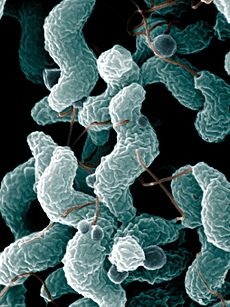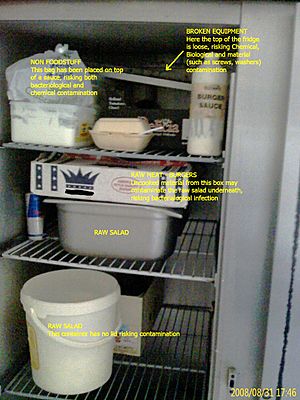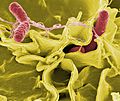Food poisoning facts for kids
Food poisoning is when someone gets sick after eating food or drink that has gone bad or is dirty. It's a common problem that affects many people every year.
There are two main ways food can make you sick. One way is called a food infection. This happens when the food contains tiny living things, like bacteria or viruses. These tiny germs get into your body when you eat the food and then make you sick.
The other way is called food intoxication. This happens when the food has harmful chemicals called toxins. These toxins can be made by bacteria, even if the bacteria themselves are no longer in the food. So, you can get sick from the toxins, even if the germs that made them are gone.
Even though we call it "food poisoning," most cases are caused by these tiny germs, not by chemical poisons. Things like bacteria, viruses, or parasites can get into food and make it unsafe. In the United States, about 76 million people get sick from food each year. About 5,000 of them die.
Signs and symptoms

When you get food poisoning, you might start feeling sick a few hours or even a few days after eating. The exact symptoms depend on what made you sick.
Common signs of food poisoning include:
- Feeling sick to your stomach
- Stomach ache
- Throwing up
- Loose stools
- Stomach flu
- Fever
- Headache
- Feeling very tired
Most of the time, people get better completely after a short time of feeling unwell. However, food poisoning can sometimes cause serious health problems. It can even be deadly for some people.
People who are at higher risk of serious illness include:
- Babies and young children
- Pregnant women and their unborn babies
- Older people
- People who are already sick
- Anyone with a weak immune system (the body's defense system)
For example, some bacteria like Campylobacter or Salmonella can cause problems like joint pain weeks after the stomach illness. Also, people with liver problems can get very sick from germs found in foods like oysters or crabs.
Images for kids
-
Storing food properly in a refrigerator helps stop food poisoning.
See also
 In Spanish: Intoxicación alimentaria para niños
In Spanish: Intoxicación alimentaria para niños
 | Mary Eliza Mahoney |
 | Susie King Taylor |
 | Ida Gray |
 | Eliza Ann Grier |




